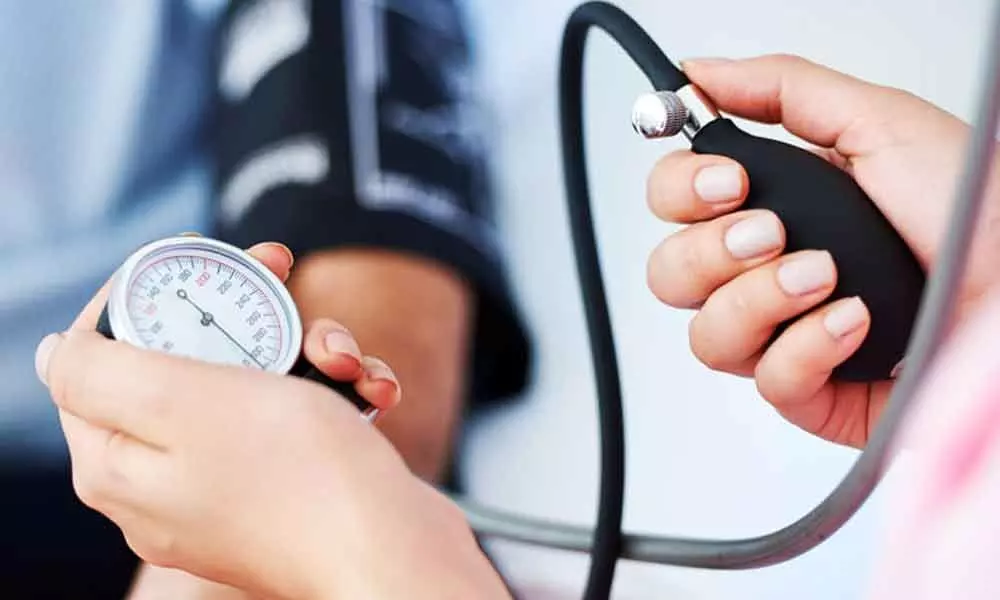Blood pressure medication works best when taken at bed time

A new study has revealed that people with high blood pressure who take all their anti-hypertensive medication in one go at bedtime have better-controlled blood pressure and a significantly lower risk of death or illness.
A new study has revealed that people with high blood pressure who take all their anti-hypertensive medication in one go at bedtime have better-controlled blood pressure and a significantly lower risk of death or illness caused by heart or blood vessel problems as compared to those who take their medication in the morning.
The 'Hygia Chronotherapy Trial', which has been published in the European Heart Journal 2019 today, is the largest to investigate the effect of the time of day when people take their anti-hypertensive medication on the risk of cardiovascular problems.
The 'Hygia Chronotherapy Trial' is unusual in monitoring blood pressure for 48 hours, rather than the more usual 24 hours.
The researchers, who are part of the Hygia Project led by Prof Ramon C Hermida, Director of the Bioengineering and Chronobiology Labs at the University of Vigo, Spain, found that patients who took their medication at bedtime had nearly half the risk (45 pc reduction) of dying from or suffering heart attacks, myocardial infarction, stroke, heart failure or requiring a procedure to unblock narrowed arteries (coronary revascularisation) as compared to patients who took their medication on waking.
The researchers had adjusted their analyses to take account of factors that could affect the results such as age, sex, Type 2 diabetes, kidney disease, and smoking and cholesterol levels.
When they looked at individual outcomes, they found that the risk of death from heart or blood vessel problems was reduced by 66 per cent, the risk of myocardial infarction was reduced by 44 per cent, coronary revascularisation by 40 per cent, heart failure by 42 per cent, and stroke by 49 per cent.
Prof Hermida said: "Current guidelines on the treatment of hypertension do not mention or recommend any preferred treatment time. Morning ingestion has been the most common recommendation by physicians based on the misleading goal of reducing morning blood pressure levels."
"However, the Hygia Project has reported previously that average systolic blood pressure when a person is asleep is the most significant and independent indication of cardiovascular disease risk, regardless of blood pressure measurements taken while awake or when visiting a doctor," added Prof Hermida.
Furthermore, there are no studies showing that treating hypertension in the morning improves the reduction in the risk of cardiovascular disease.
"The results of this study show that patients who routinely take their anti-hypertensive medication at bedtime, as opposed to when they wake up, have better-controlled blood pressure and, most importantly, a significantly decreased risk of death or illness from heart and blood vessel problems."
The 'Hygia Project' is composed of a network of 40 primary care centres within the Galician Social Security Health Service in northern Spain. A total of 292 doctors are involved in the project and have been trained in ambulatory blood pressure monitoring, which involves patients wearing a special cuff that records blood pressure at regular intervals throughout the day and night.
Between 2008 and 2018, 10,614 men and 8,470 women of Caucasian Spanish origin, aged 18 or over, who had been diagnosed with hypertension by means of ambulatory blood pressure monitoring, were recruited to the trial. They had to adhere to a routine of daytime activity and night-time sleep, which means that it is not possible to say if the study findings apply to people working night shifts.
Doctors took the patients' blood pressure when they joined the study and at each subsequent clinic visit. Ambulatory blood pressure monitoring over a 48-hour period took place after each clinic visit and at least once a year. This gave doctors accurate information on average blood pressures over the 48 hours, including how much blood pressure decreased or 'dipped' while the patients were asleep.
During a median (average) of 6.3 years follow-up, 1,752 patients died from heart or blood vessel problems or experienced myocardial infarction, stroke, heart failure or coronary revascularisation.
Data from ambulatory blood pressure monitoring showed that patients taking their medication at bedtime had significantly lower average blood pressure both at night and during the day, and their blood pressure dipped more at night when compared with patients taking their medication on waking.
A progressive decrease in night-time systolic blood pressure during the follow-up period was the most significant predictor of a reduced risk of cardiovascular disease.
Prof Hermida said: "The findings from the Hygia Chronotherapy Trial and those previously reported from the Hygia Project indicate that average blood pressure levels while asleep and night-time blood pressure dipping, but not day-time blood pressure or blood pressure measured in the clinic, are jointly the most significant blood pressure-derived markers of cardiovascular risk."
"Accordingly, round-the-clock ambulatory blood pressure monitoring should be the recommended way to diagnose true arterial hypertension and to assess the risk of cardiovascular disease.
In addition, decreasing the average systolic blood pressure while asleep and increasing the sleep-time relative decline in blood pressure towards more normal dipper blood pressure patterns are both significantly protective, thus constituting a joint novel therapeutic target for reducing cardiovascular risk."
The Hygia Project is currently investigating what the best blood pressure levels should be while asleep in order to reduce cardiovascular risk most effectively in the THADEUS Trial (Treatment of Hypertension During Sleep.
Limitations of the 'Hygia Chronotherapy Trial' include that it requires validation in other ethnic groups; the question of whether the same results would be seen in shift workers also requires investigation; and patients were not assigned to specific hypertension medication classes or specific lists of medications within each class -- their treatment was chosen by their doctors according to current clinical practice.














